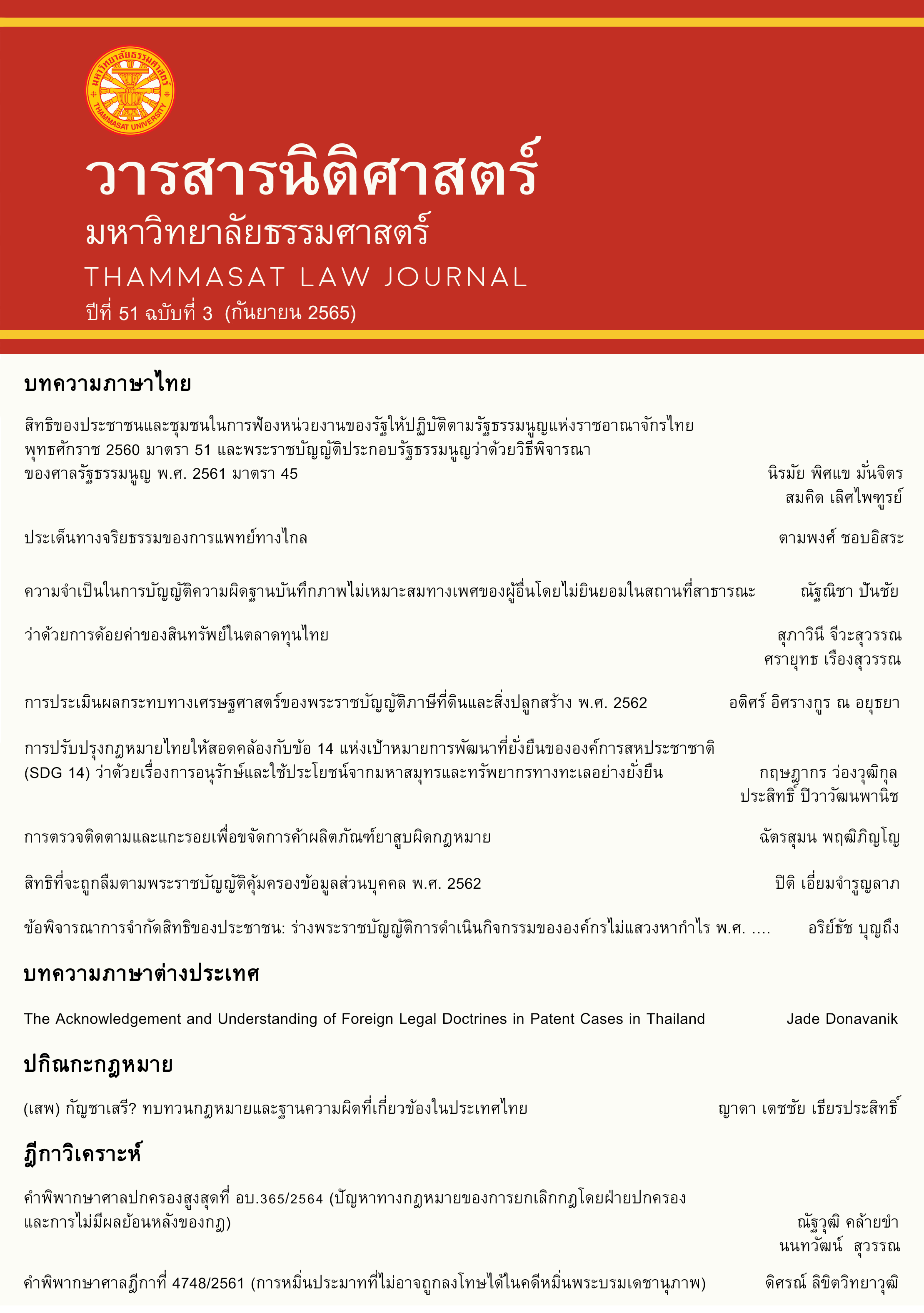ว่าด้วยการด้อยค่าของสินทรัพย์ในตลาดทุนไทย
คำสำคัญ:
กฎหมายการบัญชี, คุณภาพรายงานทางการเงิน, การด้อยค่าของสินทรัพย์, มาตรฐานการบัญชี, มาตรฐานการบัญชีฉบับที่ 36, มาตรฐานการรายงานทางการเงินระหว่างประเทศบทคัดย่อ
การบังคับใช้มาตรฐานการบัญชีในฐานะที่เป็นกฎหมาย ถือเป็นเรื่องที่มีความสำคัญอย่างยิ่งสำหรับการกำหนดนโยบายการกำกับดูแลบริษัทจดทะเบียน การศึกษาเกี่ยวกักบการปฏิบัติตามมาตรฐานการบัญชีฉบับที่ 36 เรื่อง การด้อยค่าของสินทรัพย์ มีความสำคัญในภาคปฏิบัติเพราะเป็นการสร้างความเข้าใจในกลไกที่ส่งเสริมให้กิจการสะท้อนความเสี่ยงของกำไรในอนาคตบนงบการเงินปัจจุบัน บทความฉบับนี้จึงมุ่งศึกษารูปแบบของการบังคับใช้มาตรฐานฉบับดังกล่าวในประเทศไทย ผลการศึกษาเชิงประจักษ์ชี้ให้เห็นว่า การรายงานรายการด้อยค่าของสินทรัพย์มีความสม่ำเสมอในมิติของเวลาและมิติของอุตสาหกรรม และทุก ๆ 3 บริษัทจะมี 1 บริษัทที่รายงานข้อมูลการด้อยค่าของสินทรัพย์ในรอบปีบัญชีปัจจุบัน อุตสาหกรรมที่มีความอ่อนไหวต่อความไม่แน่นอนในกระแสเงินสดในอนาคตมีแนวโน้มที่จะรายงานการด้อยค่าของสินทรัพย์ ผลการศึกษายังแสดงให้เห็นอีกว่า บริษัทที่รายงานข้อมูลการด้อยค่าจะมีค่าสอบบัญชีที่สูงกว่า จำนวนประเด็นสำคัญในการตรวจสอบที่มากกว่า และมีจำนวนคณะกรรมการตรวจสอบมากกว่า ซึ่งสะท้อนบทบาทที่สำคัญของผู้สอบบัญชีและคณะกรรมการตรวจสอบเกี่ยวกับการด้อยค่าของสินทรัพย์ของกิจการอย่างเป็นรูปธรรม อย่างไรก็ดี การสอบบัญชีด้วยสำนักงานสอบบัญชีระหว่างประเทศ (บิ๊กโฟร์) ไม่เกี่ยวข้องกับการรายงานการด้อยค่าของสินทรัพย์
เอกสารอ้างอิง
Ball, R., Robin, A. & Wu, J. S, ‘Incentive versus standards: Properties of accounting income in four East Asian economies’ (2003) 36(1-3) Journal of Accounting and Economics 235, 235-270.
Barth, M. E., Landsman, W. R. & Lang, M. H, ‘International accounting standards and accounting quality’ (2008) 46(3) Journal of accounting research 467, 467-498.
Bens, D. A., Heltzer, W. & Segal, B, ‘The information content of goodwill impairments and SFAS 142’ (2011) 26(3) Journal of Accounting, Auditing and Finance 527, 527-555.
Burgstahler, D. C., Hail, L. & Leuz, C, ‘The importance of reporting incentives: Earnings management in European private and public firms’ (2006) 81(5) The Accounting Review 983, 983-1016.
Bushman, R. M. & Piotroski, J. D, ‘Financial reporting incentives for conservative accounting: The influence of legal and political institutions’ (2006) 42(1-2) Journal of Accounting and Economics 107, 107-148.
Coulton, J., Livne, G., Pettinicchio, A. K. & Taylor, S. L, ‘Abnormal Audit Fees and Accounting Quality’ (2016) <https://papers.ssrn.com/sol3/papers.cfm?abstract_id=2826272> accessed 10 October 2520.
Chen, C., Kohlbeck, M. & Warfield, T, ‘Timeliness of impairment recognition: Evidence from the initial adoption of SFAS 142’ (2008) 24(1) Advances in Accounting 72, 72-81.
Ewert, R. & Wagenhofer, A, ‘Economic effects of tightening accounting standards to restrict earnings management’ (2005) 80(4) The Accounting Review 1101, 1101-1124.
Florou, A. & Pope, P. F, ‘Mandatory IFRS adoption and institutional investment decisions’ (2012) 87(6) The Accounting Review 1993, 1993-2025.
Hail, L., Leuz, C. & Wysocki, P. D, ‘Global accounting convergence and the potential adoption of IFRS by the U.S. (Part I): Conceptual underpinnings and economic analysis’ (2010) 24(3) Accounting Horizons 355, 355-394.
Horton, J. & Serafeim, G, ‘Market reaction to and valuation of IFRS reconciliation adjustments: First evidence from the UK’ (2010) 15(4) Review of Accounting Studies 725, 725-751.
Leuz, C., Nanda, D. J. & Wysocki, P. D, ‘Earnings management and investor protection: An international comparison’ (2003) 69(3) Journal of Financial Economics 505, 505-527.
Li, S, ‘Does mandatory adoption of International Financial Reporting Standards in the European Union reduce the cost of equity capital?’ (2010) 85(2), The Accounting Review 607, 607-636.
Livne, G., Tsipouridou, M. & Wood, A, ‘Audit Committee Competencies and Audit Effort: Evidence from Materiality and Audit Risk Areas’ (2019).
Nobes, C. W, ‘IFRS practices and the persistence of accounting system classification’ (2011) 47(3) Abacus 267, 267-283.
Riedl, E. J, ‘An examination of long-lived asset impairments’ (2004) 79(3) The Accounting Review 823, 823-852.
Street, D. L. & Gray, S. J, ‘Factors influencing the extent of corporate compliance with International Accounting Standards - Summary of a research monograph’ (2002) 11(1) Journal of International Accounting, Auditing and Taxation 51, 51-76.
สภาวิชาชีพบัญชีในพระบรมราชูปถัมภ์, มาตรฐานการบัญชี ฉบับที่ 16 เรื่อง ที่ดิน อาคาร และอุปกรณ์, (บริษัท พี.เอ.ลิฟวิ่ง จำกัด 2560).
สภาวิชาชีพบัญชีในพระบรมราชูปถัมภ์, มาตรฐานการบัญชี ฉบับที่ 36 เรื่อง การด้อยค่าของสินทรัพย์, (บริษัท พี.เอ.ลิฟวิ่ง จำกัด 2560).
สภาวิชาชีพบัญชีในพระบรมราชูปถัมภ์, มาตรฐานการบัญชี ฉบับที่ 38 เรื่อง สินทรัพย์ไม่มีตัวตน, (บริษัท พี.เอ.ลิฟวิ่ง จำกัด 2560).
สภาวิชาชีพบัญชีในพระบรมราชูปถัมภ์, มาตรฐานการรายงานทางการเงิน ฉบับที่ 3 เรื่อง การรวมธุรกิจ, (บริษัท พี.เอ.ลิฟวิ่ง จำกัด 2560).
สภาวิชาชีพบัญชีในพระบรมราชูปถัมภ์, มาตรฐานการรายงานทางการเงิน ฉบับที่ 8 เรื่อง ส่วนงานดำเนินงาน, (บริษัท พี.เอ.ลิฟวิ่ง จำกัด 2560).
ดาวน์โหลด
เผยแพร่แล้ว
ฉบับ
ประเภทบทความ
สัญญาอนุญาต
ลิขสิทธิ์ (c) 2022 วารสารนิติศาสตร์ มหาวิทยาลัยธรรมศาสตร์

อนุญาตภายใต้เงื่อนไข Creative Commons Attribution-NonCommercial-NoDerivatives 4.0 International License.
ผลงานที่ตีพิมพ์ในวารสารนิติศาสตร์เป็นลิขสิทธิ์ของวารสารนิติศาสตร์ มหาวิทยาลัยธรรมศาสตร์ และวารสารนิติศาสตร์ มหาวิทยาลัยธรรมศาสตร์ สงวนสิทธิในการเผยแพร่ผลงานที่ตีพิมพ์ในแบบรูปเล่มและทางสื่ออิเล็กทรอนิกส์อื่นใด
บทความหรือข้อความคิดเห็นใด ๆ ที่ปรากฏในวารสารนิติศาสตร์เป็นความรับผิดชอบของผู้เขียนโดยเฉพาะ คณะนิติศาสตร์ มหาวิทยาลัยธรรมศาสตร์ และบรรณาธิการไม่จําเป็นต้องเห็นด้วยหรือร่วมรับผิดชอบใด ๆ



